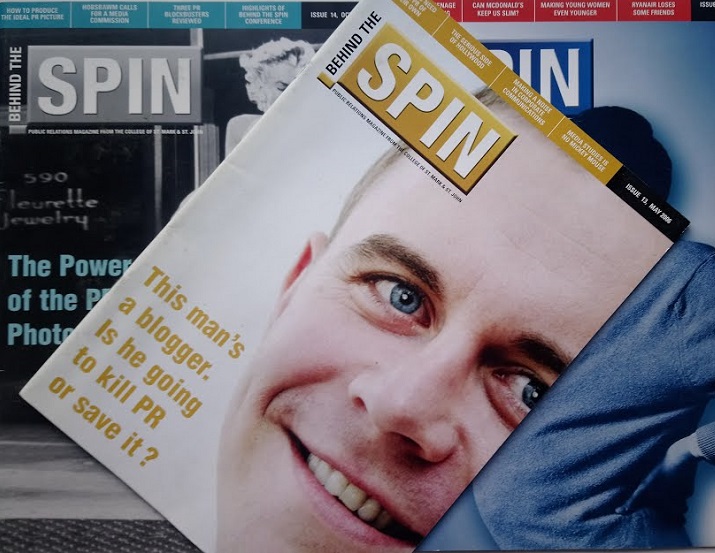The story of PR student blogging

About the author
Richard Bailey Hon FCIPR is editor of PR Academy's PR Place Insights. He teaches and assesses undergraduate, postgraduate and professional students.

Our photograph tells the story of PR student blogging.
It’s the cover of the May 2006 edition of Behind the Spin, then a printed magazine. It shows Stephen Davies, then a PR student at University of Sunderland, with the alarming strapline: ‘This man’s a blogger. Is he going to kill PR or save it?’
The question seems ludicrous today, but in May 2006 blogging was social media. YouTube, Facebook, Twitter and the rest were yet to go mainstream. So the question was really about the impact of social media on public relations.
Inside the magazine, Stephen Davies writes:
‘I started my own PR related blog – PR Blogger – in April 2005, purely out of curiosity. A lecturer at the University of Sunderland, Philip Young, uses internal blogs to communicate academic information to students, and this was one of the factors that prompted me to start my own.’
Stephen made a name for himself, went on to work for some top consultancies in London, and is now an independent consultant specialising in digital PR. I named him yesterday (he now goes by the name Ste Davies, probably for brand and SEO purposes) among current thought leaders in our industry.
I’m pleased to see he credits his lecturer Philip Young for inspiration. Now at Birmingham City University, Young co-authored the second edition of Online Public Relations with David Phillips and has contributed chapters to Alison Theaker’s The Public Relations Handbook and scholarly texts with Timothy Coombs and others.
The key phrase though is that he started his blog ‘purely out of curiosity’. Applied curiosity turned a PR graduate into a hot property in the graduate jobs market and has helped to propel a consulting career in the digital space.
Curiosity is at the heart of learning, and should be central to the student experience. Unfortunately, the higher fees introduced since then have had an unintended consequence. They have made most students reluctant to focus on anything outside the narrow curriculum and their assessed work.
Reluctant, maybe, but there’s always space for exceptions. Let’s fast forward a decade and look at the #bestPRblogs contest that ran at Behind the Spin last academic year (by then an online publication).
Marcel Klebba, studying at the University of Westminster, devoted a large amount of energy and creativity in building a content-rich student blog. At some points in the year, I feared it was so good that it would put off anyone else from competing.
Yet Orlagh Shanks, from Liverpool John Moores University, rose to the challenge with wonderful storytelling skills.
Most amazing of all, neither won last year’s contest. The accolade went to Bournemouth University’s Lucy Hayball.
Lucy and Orlagh are both still students, on their placement year in London, with their final year still to come. Marcel has since graduated, he’s already working in public relations, and his blog has won a national award ahead of industry figures he admires such as Stephen Waddington.
This academic year, I’ve not discovered many new voices writing on their own blogs – certainly not at the level and consistency of those I’ve just mentioned. They may be out there, but I’ve yet to discover them.
Instead, the show stopper this year is a group blog from Conor McGrath’s Ulster University students. This is not about individuals, it’s about collective effort. So far, I’ve featured 44 posts from 33 different students this academic year. I’m aware of similar group blogs showcasing student writing at Leeds Beckett and Manchester Metropolitan.
These group blogs may be the answer to the curiosity conundrum. If blogging is built into the curriculum and required for assessment purposes, then the motivation will be there. The collective effort should also provide an appealing showcase to attract future students (there’s a nationwide problem with recruitment onto PR degree courses).
Yet there are risks. By citing the Stephen Davies example, I’m not only showing that blogging can help fast track a career, but that there’s a long memory and it’s hard to cover your tracks. I’m quoting from a print magazine that I’ve kept in an archive, but most of us would turn to Google and its archive of content from the web.
This means there’s a risk that students will be compelled to make their mistakes in public. Employers who find less than perfectly written posts may be less forgiving than university lecturers. Unfortunately, this may lead to more caution and less risk taking, once again killing curiosity.
It’s a challenge. To resolve it, let’s finish with Marcel Klebba. His written English was not perfect (Polish is his first language) but that did not hold him back.
We need curious students. We need those prepared to follow a passion and take a risk. The rewards are out there (and I’m not referring to making money from blogging). Marcel used his blog to make connections, and his achievement is a tribute to the power of networking (old-fashioned face-to-face networking, rather than social networks).
Stephen and Marcel both seized the opportunity to learn. They became the equal of industry practitioners and had much they could teach their lecturers.
Blogging did not kill PR. But it could help save education.